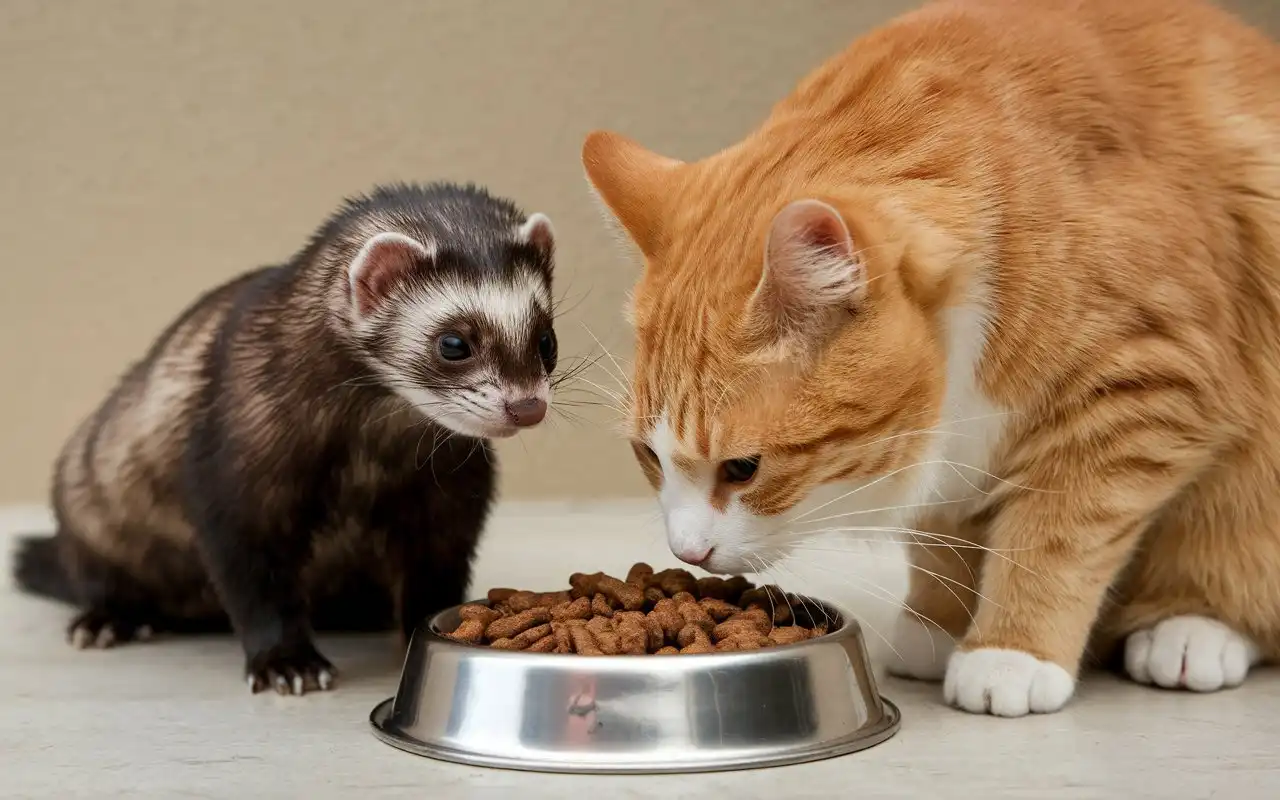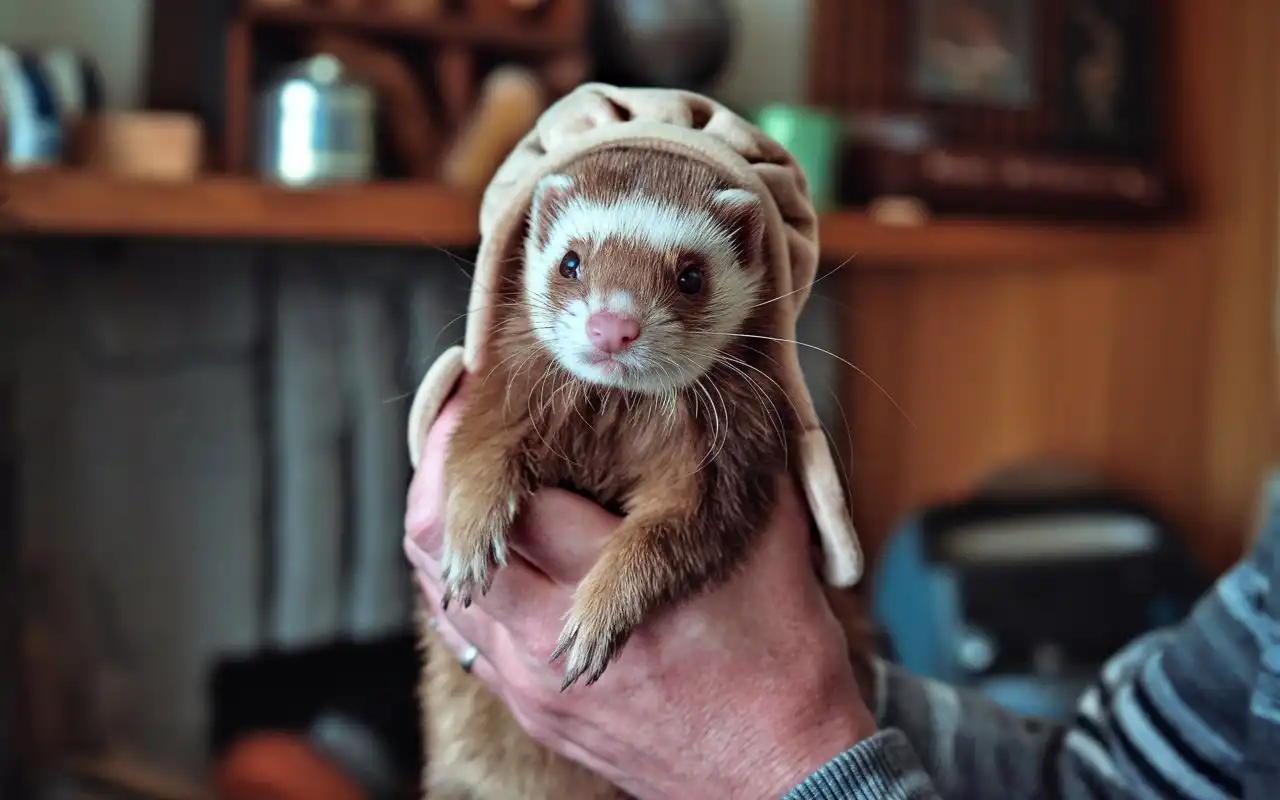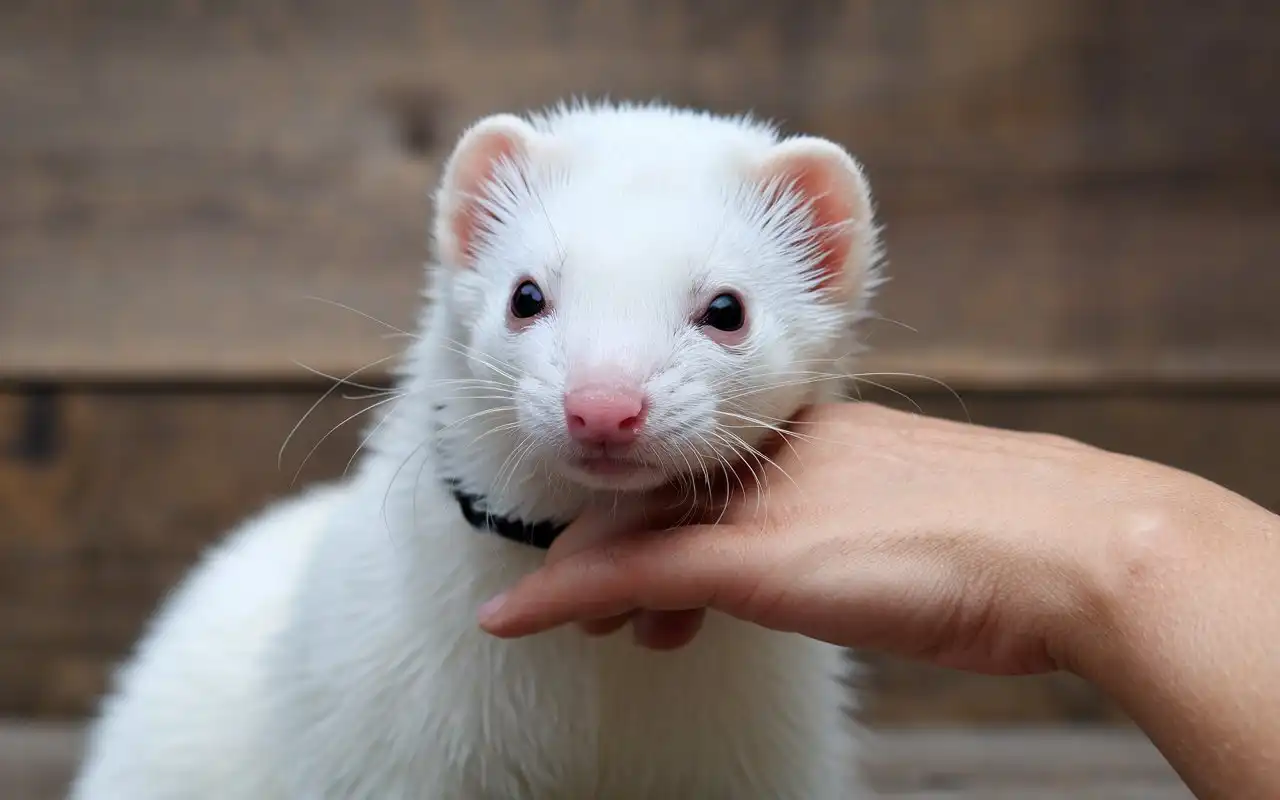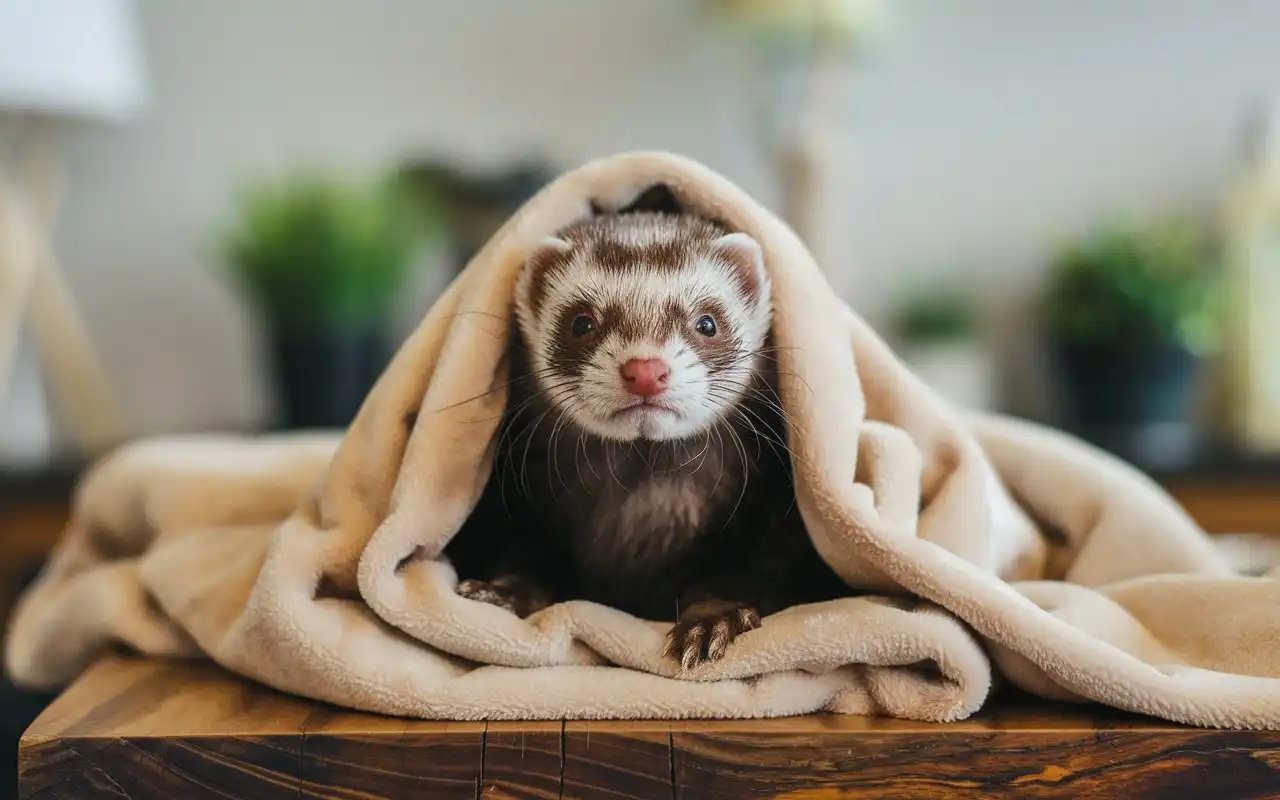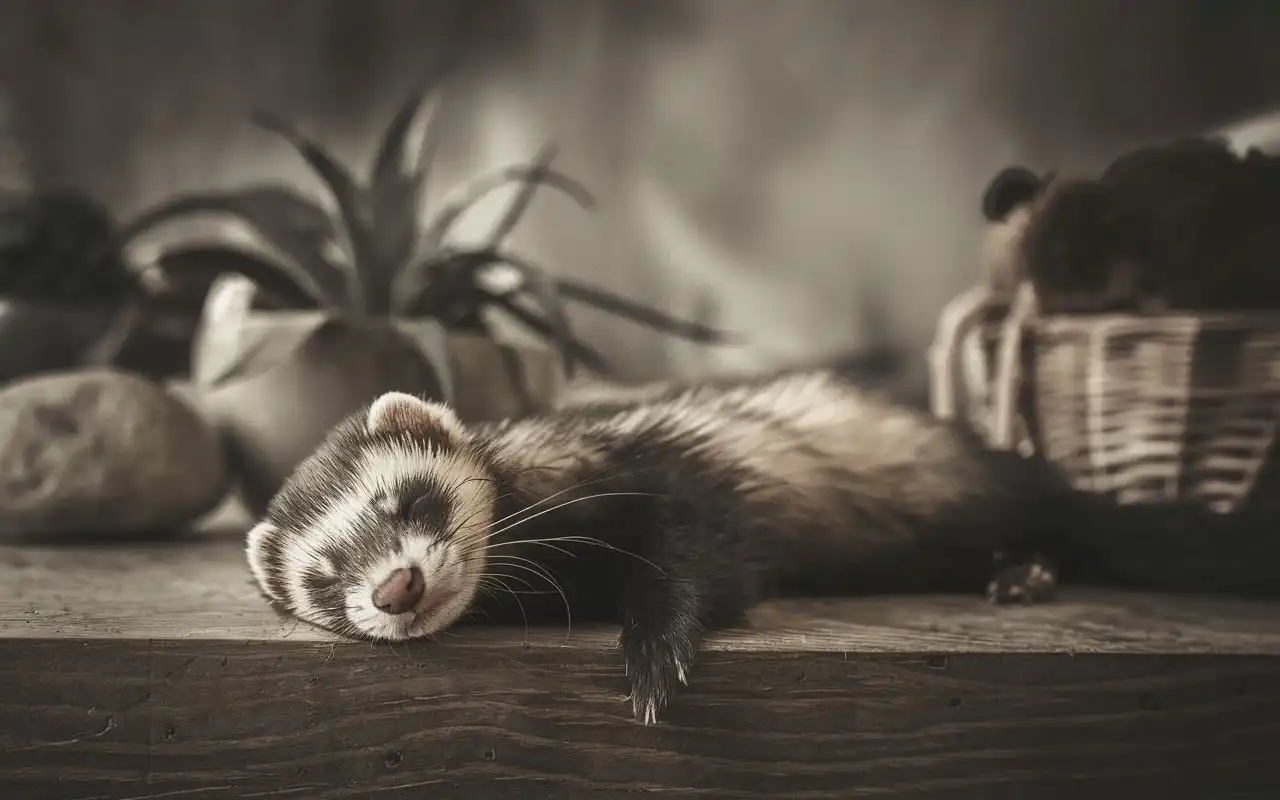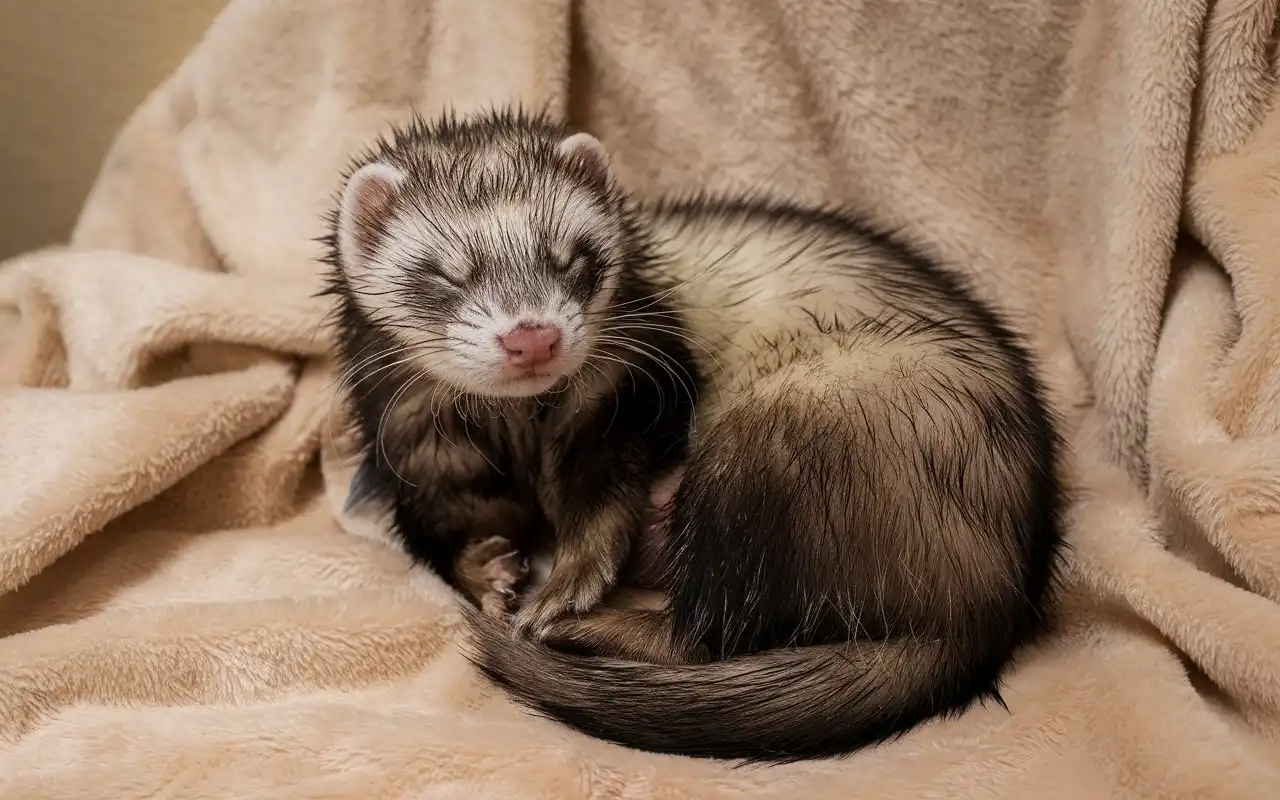When it comes to ferret care, one of the most common questions is, Can ferrets eat cat food? Ferrets are compel carnivores with specific dietary needs. Cat food might seem convenient, but it may not meet their nutritional needs. This article will explore whether it is safe to feed cat food to ferrets. We will discuss key factors and suggest better food options for a balanced diet.
Table of Contents
Understanding the Ferret’s Diet
Ferret Dietary Needs and Requirements
Ferrets are strict carnivores, meaning their diet must primarily consist of animal-based proteins. Their digestive system can handle high protein and fat. It has a low tolerance for carbs. Unlike some other pets, they cannot properly digest plant-based ingredients. Thus, their food should contain a protein content of at least 32-38% and a fat content of around 15-20%.
Ferrets have short digestive tracts. They process food quickly. So, they need frequent feedings throughout the day. This need for a protein-rich diet means any change can harm their health. It can cause malnutrition or digestive issues. So, it is critical to provide a diet. It must be high in protein, easily digestible, and have few fillers or carbs.
Why Protein is Essential for Ferrets
Protein is the building block of a ferret’s diet. It provides the energy they need to stay active and supports muscle development and overall health. A lack of protein can make ferrets lethargic and sick. They may also lose muscle. This is why selecting food rich in high-quality animal protein is vital for their well-being.
Ferrets need taurine. It is an amino acid. It supports heart function, vision, and growth. Taurine is in animal tissues. So, animal-based proteins are better. Cat food has taurine for feline health. But, the amounts may not meet a ferret’s metabolic needs.
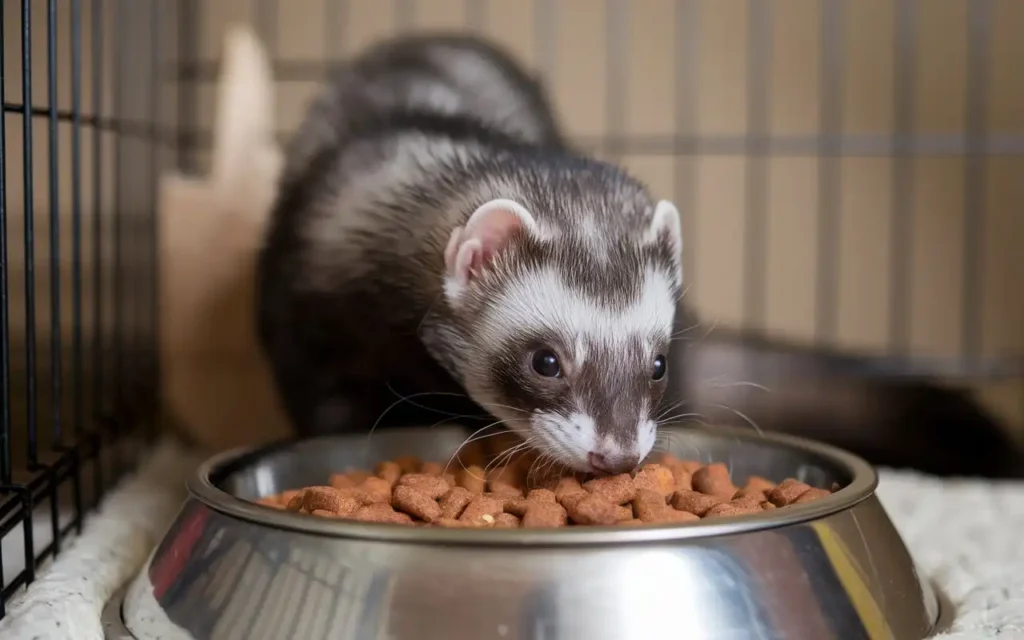
What is Cat Food Made Of?
Typical Ingredients in Cat Food
Cat food generally contains a mixture of meat, grains, vitamins, and minerals. The protein source may include chicken, fish, or beef, while grains such as rice or corn may be added as fillers. Additionally, cat food often contains taurine, an amino acid crucial for felines. However, cat food’s carb content can vary greatly. It may not meet a ferret’s dietary needs.
Most commercial cat foods aim to meet cats’ specific dietary needs. These include a mix of protein, fat, and carbohydrates. Even high-protein cat foods often use plants like soy or wheat. A ferret’s digestive system struggles to process them. This is why, despite some similarities, cat food is not always the perfect fit for ferrets.
Nutritional Differences Between Cat Food and Ferret Food
While both ferrets and cats are carnivores, their dietary needs aren’t identical. Ferret food is formulated with a higher protein and fat ratio, while cat food may include more plant-based fillers. Ferrets need a diet for their fast metabolism. Cat food is for a cat’s slower digestion. These differences can impact a ferret’s long-term health if fed cat food consistently.
Cat food may lack certain fatty acids and vitamins that ferrets need. They are essential for a shiny coat, strong muscles, and a healthy immune system. As a result, long-term feeding of cat food could result in vitamin deficiencies that are detrimental to a ferret’s well-being.

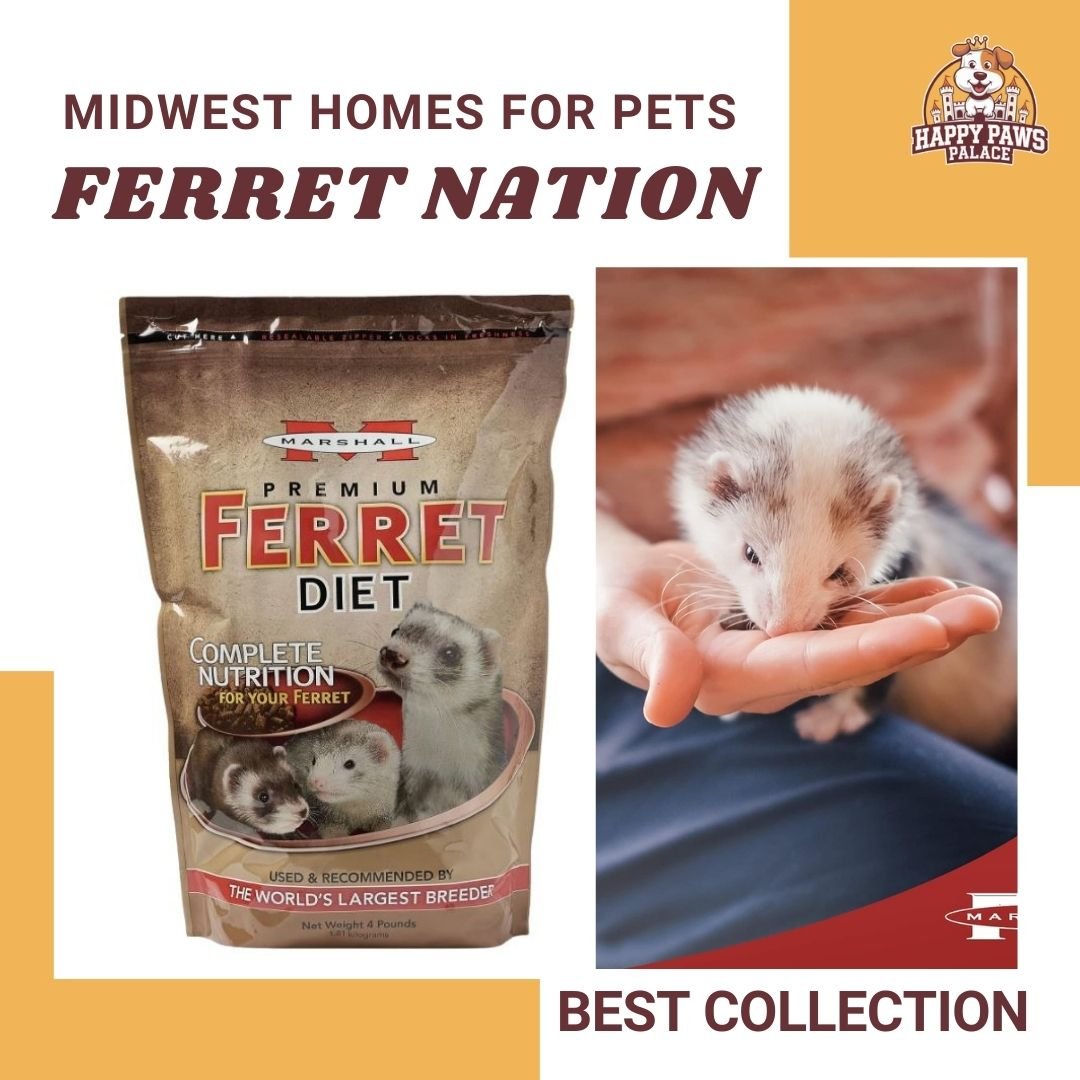
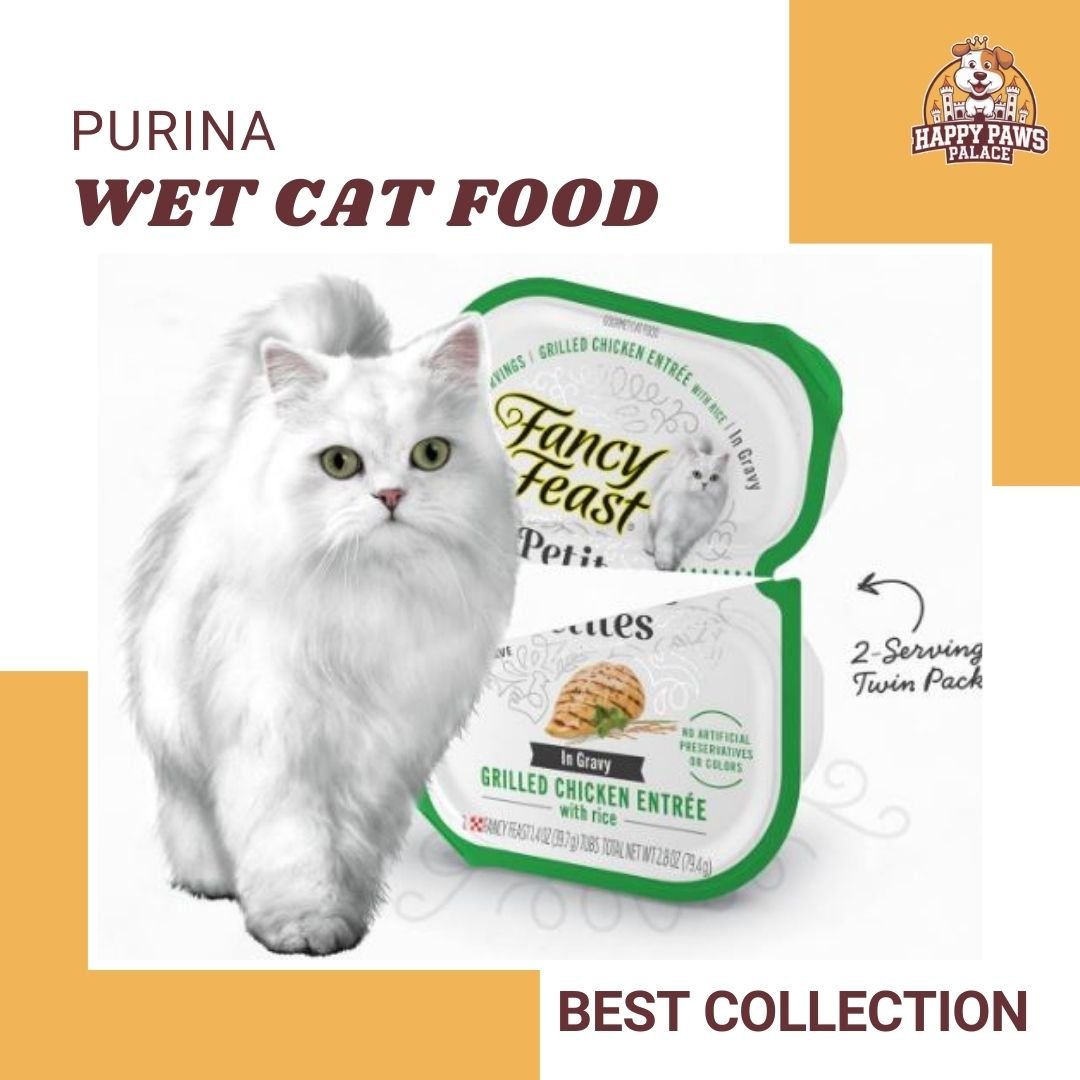
Can Ferrets Eat Cat Food Safely?
Occasional Use vs. Regular Feeding
Occasionally feeding cat food to a ferret, in emergencies, may not harm it if ferret food is unavailable. However, relying on cat food as a regular diet can lead to nutritional imbalances. Cat food may lack sufficient fat and protein that ferrets need for energy and proper body function.
In emergency scenarios, it’s crucial to select a high-quality cat food that is high in protein and low in carbohydrates. Wet cat food might be a better option as it tends to have fewer fillers. However, it’s important to switch back to ferret-specific food as soon as possible to ensure a balanced diet.
How Cat Food Affects a Ferret’s Health
Long-term use of cat food can harm ferrets. It may cause malnutrition, weight loss, or gut issues. Cat food has plant-based ingredients. They can be hard for ferrets to digest. This may cause discomfort and digestive issues.
Long-term feeding of cat food can cause nutrient deficiencies in ferrets. It can lower biotin, omega-3 fatty acids, and taurine levels. Dry cat food’s texture may harm ferrets’ teeth. It differs from their natural, prey-like diet.
Types of Cat Food: Which Is Better for Ferrets?
Dry Cat Food vs. Wet Cat Food for Ferrets
Between dry and wet cat food, wet food is generally a better option for ferrets. Wet food has more moisture. It can help prevent dehydration, a common issue in ferrets. Dry cat food is convenient. But, it often has fillers that ferrets can’t digest. Nonetheless, neither option is a perfect substitute for ferret-specific food.
Wet cat food has a texture like raw meat. Ferrets are naturally inclined to eat it. Wet cat food lacks some nutrients that ferrets need for long-term health. It has low omega-3 fatty acids, for example.
Best Cat Food Brands for Ferrets
If you must use cat food for your ferret temporarily, look for brands that are high in protein and low in carbs. In emergencies, some premium cat foods are better. They use whole meats and minimal fillers. You can consider brands like Orijen or Blue Buffalo. However, they should not replace a balanced ferret diet.
For those needing to use cat food, it’s crucial to check the ingredient list and ensure that meat is the primary ingredient. Avoid products with a high grain or vegetable filler content. They can cause digestive issues for ferrets over time.
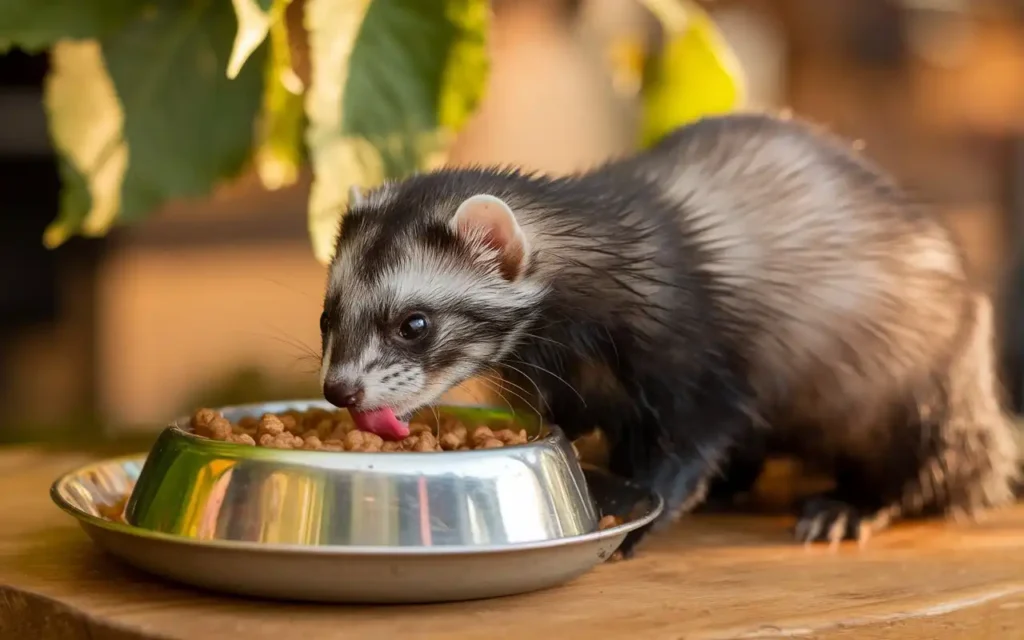
The Risks of Feeding Cat Food to Ferrets
Lack of Essential Nutrients
Cat food may not provide the balanced nutrition that ferrets need. It often lacks the right amount of essential fatty acids and specific vitamins required by ferrets. Long-term feeding of cat food can cause vitamin deficiencies. This can harm the immune system and overall health.
For example, ferrets need high levels of vitamins A and D. Ferret-specific foods have them in higher concentrations. These vitamins are critical for maintaining healthy vision, bone growth, and immune function. Without them, ferrets may become more prone to infections and diseases.
Digestive Issues and Potential Allergies
Ferrets are prone to gastrointestinal problems when their diet contains ingredients they can’t digest well. Feeding them cat food with grains, soy, or artificial additives could cause allergic reactions or digestive upset. Symptoms like diarrhea, vomiting, or bloating are common signs that the food isn’t agreeing with them.
In severe cases, a poor diet can lead to gastrointestinal blockages, which can be life-threatening for ferrets. If a ferret has ongoing digestive issues after eating cat food, consult a vet at once.
Long-term Health Concerns
Long-term feeding of cat food can lead to serious health conditions such as pancreatic issues and bladder stones in ferrets. These conditions require costly veterinary care and can greatly affect the quality of life for your pet.
Ferrets may suffer from insulinoma, a common pancreatic tumor, if their diet is too high in carbs. Most cat foods have more carbs than ferret food. So, this risk is relevant when considering the long-term feeding of cat food to ferrets.
When to Feed Cat Food to a Ferret?
Emergency Situations
In cases where ferret-specific food is unavailable, using high-protein cat food for a short period can be a viable solution. It’s better to provide them with some form of nutrition rather than letting them go hungry. Just ensure that you switch back to their proper diet as soon as possible.
In emergencies, choose cat food with animal protein as the first ingredient. Avoid those with fillers or grains. It’s not perfect, but it can prevent short-term malnutrition until ferret food is available again.
Transitioning Back to Ferret Food
After a short use of cat food, it’s vital to gradually reintroduce ferret food to avoid digestive issues. First, mix a little ferret food with the cat food. Gradually increase the ferret food ratio until your ferret is back on its regular diet.
A gradual transition over 7-10 days is ideal, as it allows the ferret’s digestive system to adapt without causing stomach upset. Watch your ferret for any changes in behavior or stool during this transition.
Signs That Cat Food Isn’t Suitable for Your Ferret
Behavioral Changes in Ferrets
One of the first indicators that a diet isn’t suitable for your ferret is a change in behavior. When a ferret’s diet lacks the necessary nutrients, you might notice a drop in energy levels. Ferrets are active and curious by nature. If your pet is less playful or more lethargic, it may have a nutritional imbalance. If a ferret’s diet lacks the essential proteins and fats, it may also become more irritable or anxious.
Keeping track of your ferret’s usual behavior is essential for spotting these changes. If your ferret sleeps more than it plays or explores, check its diet. It may need better nutrients.
Physical Symptoms to Watch For
In addition to behavioral changes, physical symptoms can provide clues that your ferret’s diet isn’t meeting its needs. Weight loss is a common sign. It is especially true if the diet lacks the necessary fats to maintain a healthy weight. A dull, rough coat in your ferret may signal a lack of essential fatty acids. These are in high-quality ferret food but less so in cat food.
Digestive issues like diarrhea or frequent vomiting are clear signs that a diet change is needed. Ferrets have sensitive stomachs. Fillers in many cat foods can be hard for them to digest. Check your ferret’s stool. Loose or watery stools may mean their diet needs adjusting.
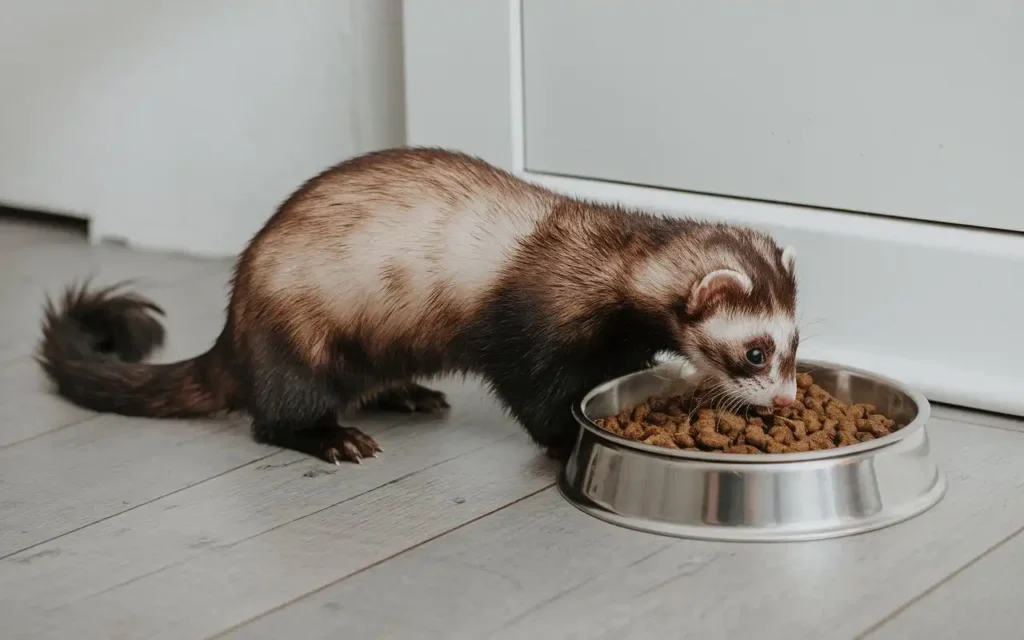
Can Kittens and Ferrets Share the Same Food?
Differences Between Kitten Food and Ferret Food
Kitten food has more protein and fat than regular cat food. It is a better option if you must feed your ferret cat food for a while. However, there are still significant differences between kitten food and ferret-specific diets. Kitten food may have more protein. But, it may lack the right balance of amino acids and vitamins that ferrets need for long-term health.
Kitten food might also have added calcium for bone growth, which isn’t as critical for adult ferrets. Kitten food is safer than regular cat food for a short time. But, it doesn’t meet a ferret’s dietary needs over the long term.
When It Might Be Safe
In an emergency, you can feed kitten food if ferret food is unavailable. But do it for no more than a few days. Always choose high-protein, grain-free options. Consult your vet if you need to extend the use of kitten food. It’s important to ensure that kitten food is merely a stopgap measure, not a replacement.
If you feed kitten food, watch your ferret for any signs of distress. In emergencies, feed them a diet that matches their natural needs. This will keep them as healthy as possible until you can switch back to a proper ferret diet.
Expert Opinions on Feeding Ferrets Cat Food
What Veterinarians Recommend
Veterinarians generally caution against using cat food as a staple in a ferret’s diet. Experts say that ferret food is made to meet their high protein and fat needs. Some high-quality cat foods may meet the minimum protein levels. But, they often have plant-based ingredients that ferrets cannot digest.
Veterinarians stress that ferrets need species-specific diets. They warn that long-term feeding of cat food can cause serious health issues, like pancreatic disease or malnutrition. If you must use cat food, consult a vet. They can help you choose the best temporary option. Transition back to ferret food as soon as possible.
Common Myths Debunked
A common myth among pet owners is that all carnivorous pets, like cats and ferrets, can eat the same food. However, both species need protein. But, their nutrient needs differ. Ferrets have a higher metabolism than cats. They need different fat and protein levels. So, ferret food is not interchangeable with cat food.
Another myth is that premium cat food gives ferrets a balanced diet. Even high-end cat food may lack some micronutrients. It may also lack the right balance of fatty acids. They are crucial for a ferret’s health.
Adjusting Your Ferret’s Nutrition
Step-by-Step Transition Process
To avoid upsetting your ferret’s stomach, switch back to a proper diet after using cat food. Do it gradually. Mix 25% ferret food with 75% cat food. Slowly increase the ferret food every 2 to 3 days. This slow change helps your ferret’s gut adapt. It prevents diarrhea and other digestive issues.
By day 7 or 8, the goal is to have your ferret eating 100% ferret food again. Watch your ferret’s behavior and stool. This will ensure a smooth transition. If any digestive issues arise, slow the transition. Then, consult your vet for guidance.
Tips for Picky Eaters
Ferrets can be picky eaters. They get used to a certain food. If your ferret won’t eat the new diet, try mixing in a favorite treat, like cooked chicken or salmon oil, to entice them. You can also warm up the food slightly to release the aroma, which can make it more appealing to a picky ferret.
Patience is key during this process. Try not to give in to their stubbornness by continuing to offer the healthier food option. Be consistent and persistent. This will help your ferret adjust to their new diet. It will ensure they get the nutrients they need.
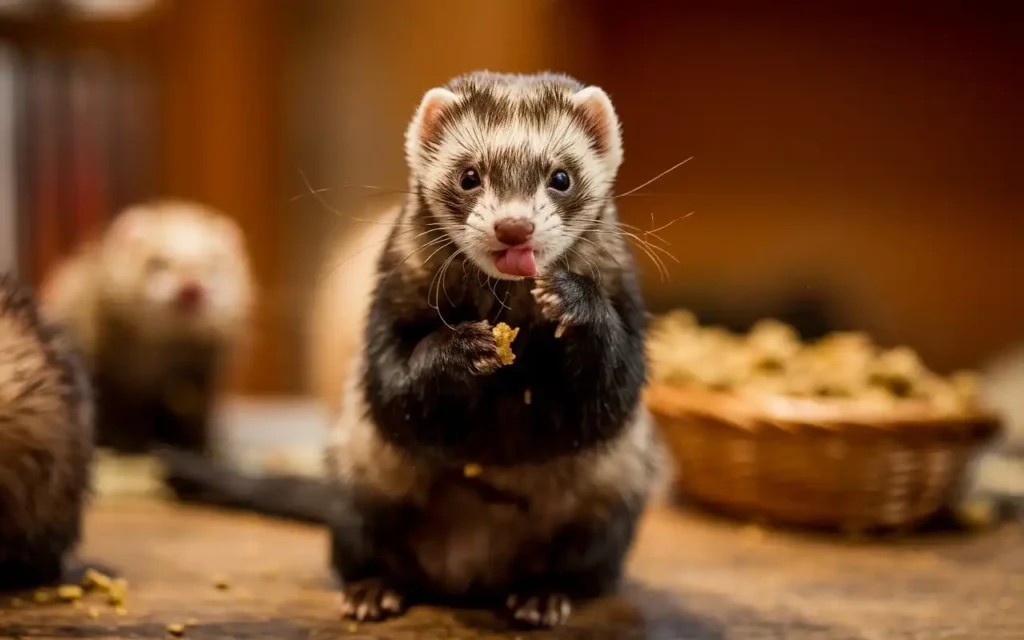
Conclusion
In emergencies, cat food can be a quick fix for ferrets. But, it is not good for their long-term health. Ferrets need a high-protein diet with specific amino acids and low carbs. Most cat foods can’t provide this. To keep your ferret healthy and happy, feed it food made for ferrets. If you must use cat food, pick a high-protein, low-carb option. Transition back to a balanced ferret diet as soon as possible.

